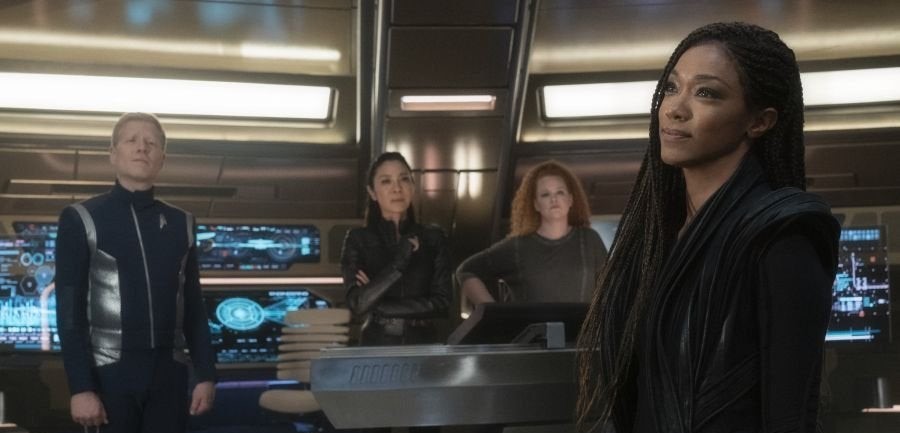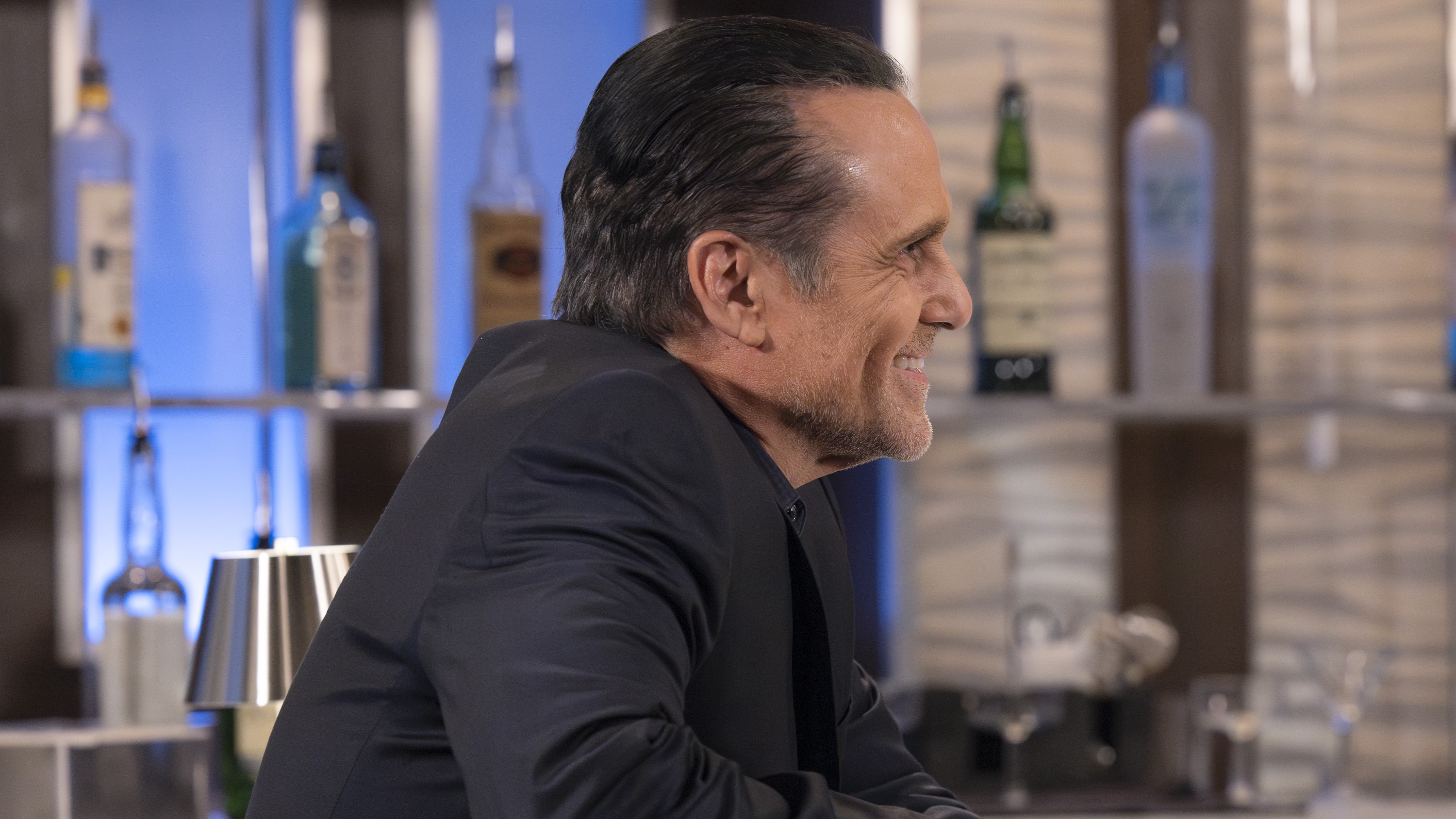What to Watch Verdict
In the process of being distinctive, Discovery's third season lives up to the legacy of what made Star Trek a decades-spanning phenomenon
Pros
- +
🖖🏻Killer soft-reboot premise.
- +
🖖🏻Episodes feel self-contained and aren't held down by an overbearing mystery plot.
- +
🖖🏻Blu del Barrio is a very welcome addition to the cast.
Cons
- -
🖖🏻Show feels uncertain about how much plot baggage to carry over from the previous season.
What is Star Trek? It’s a simple enough question that doesn’t really have a straightforward enough answer. Is it the iconography, the immediately recognizable uniforms, the starships, the distinctive alien races? Those are certainly what make Star Trek marketable, but not only have they varied in design over the franchise’s fifty-odd years of existence, but no one creates an emotional connection to a show based solely on neat production design.
This seems to have been a fundamental misunderstanding in the creation of Star Trek: Discovery’s second season. It was a season of television weighed down by the competing visions of fired showrunners and new creative lead Alex Kurtzman, a studio mandate to seed as many spin-off ideas as possible to maximize the number of Treks currently in production, and telling a story based on so much mystery box predestination that it spent more time teasing how it could eventually be a good show rather than being a good show in the moment. Never mind consistently interesting characters, philosophical quandaries of living in a multicultural universe, or even explorations of strange new worlds. Just look at young sexy Spock and remember that our series protagonist is only important because she’s related to the franchise’s most iconic character.
This preamble may not seem relevant to reviewing Discovery’s third season, but it’s necessary groundwork to lay in establishing that this season may be the most positive turnaround I’ve ever seen from a show that was testing my patience. I had hopes that the inclusion of new co-showrunner Michelle Paradise and the soft reboot premise of sending the crew of the Discovery into the far-flung future would finally rid the show of its nostalgia-baiting baggage, but I never anticipated how much of a reinvention the show would undergo. Kurtzman and Paradise have transformed this show into a modern rumination on the meaning of legacy. In essence, Discovery’s raison d’etre is now to ask “What is Star Trek?”
The first episode finds Michael Burnham (Sonequa Martin-Green) spit out on the other end of the wormhole she and the Discovery entered at the end of Season Two, forcing the damaged landing of another ship piloted by a mysterious smuggler known as Book (David Ajala). Separated from the Discovery, Michael relies on a reluctant Book to help her find a communication hub in this future 930 years removed from anything she’s known. In the process, she learns of an event known as The Burn, where about 100 years ago, nearly all dilithium in the galaxy exploded at once, effectively wiping out every warp-capable ship in Starfleet and erasing the infrastructure of the Federation overnight. So the main conflict of the first episode finds Michael using the relic equipment of her time, the iconography of Starfleet, as a literal bargaining chip to rediscover the remains of the Federation and to find whether its ideals have survived the collapse of its recognizable shape. In essence, she is willing to trade the identifiable "stuff" of Star Trek to find her way back to the core of what that stuff represents.
For as bold of a thesis statement as that is, it would mean little if the show did not change to reflect that quest for identity. Thankfully, the writing over the first four episodes is promising for its wit and for dropping the previous season’s mystery-box pretense. There is an overarching goal to Michael and Discovery finding and reestablishing themselves within the remnants of Starfleet – I don’t think it’s much of a shocking spoiler to say that Michael and the Discovery are eventually reunited – but the show has a pervasive sense of humor about itself now, prioritizing the interactions between characters as relatable and empathetic people, rather than pawns in an intricately plotted game of chess in an emotional vacuum. For instance, the first episode devotes an extended sequence to Michael being high on truth serum, elevating a phaser shootout from a plot-necessary action beat to a fun and memorable setpiece of an otherwise exposition-heavy opening.
The season has also thus far embraced an episodic plot structure that allows for each episode to be a self-contained story that serves the overarching quest. It’s reminiscent of how Voyager was a show about that crew traveling with the ultimate goal of returning home but having weekly adventures along the way. The finale of each episode seeds a mystery for the next episode to solve, but that mystery is then the plot of the next episode, not a perpetual tease that engulfs the entire season. This may seem like a small thing to find comforting, but it makes Discovery feel like Star Trek, rather than some rambling bit of fan fiction that only wants to revel in and sell you on more nostalgia.
This feels especially true from the second episode onward when the crew of the Discovery is reintroduced and the writing allows for affectionate banter. The performances of Doug Jones, Anthony Rapp, Michelle Yeoh, and Mary Wiseman have always been the series’ brightest asset, often fighting against an overabundance of plot and edgy dialogue to still be as endearing as any Trek cast that preceded them, but simply having space for these characters to catch up with one another’s feelings, and even have a communal meal together, feels revelatory.
Special mention must be given to Blu del Barrio as Adira, a non-binary teenage character who is seamlessly woven into the story without patronization and immediately stands out as someone to pay attention to. The season’s fourth episode in particular allows for del Barrio to show off their strengths as an actor, contextualized in what might be the most allegorically queer episode Star Trek has ever done, made all the more powerful for being performed by a non-binary actor. Adira holds massive potential to be a fan favorite this season, and I desperately hope they are not shoved aside after their spotlight episode.
The new season is not perfect, though that primarily seems to be a function of navigating the balance between plot continuity and thematic reboot. A massive part of Michael’s character development is brushed over in montage in the season’s third episode, which serves to establish part of the new status quo but also feels rushed as a result. The bigger issue lies in the show’s persistent allusions to Control, the AI villain of the previous season. At this point, it’s unclear whether the writers are simply alluding to the trauma the Discovery’s crew has survived, or if they really intend to reintegrate this substandard villain into a season that hasn’t really needed one, but it would be nice if the show eventually committed to leaving the past in the very literal past.
Because that’s what is so invigorating about Star Trek: Discovery’s third bite at the apple. It’s figuring out its own identity as a part of Star Trek lore by exploring a strange new setting, by going where no Trek has gone before. But in the process of being distinctive, it’s also living up to the legacy of what made Star Trek a decades-spanning phenomenon, to begin with. What is Star Trek? There is nothing more Star Trek than trying to find out.
Star Trek: Discovery is available to stream on Paramount Plus.
Leigh Monson has been a professional film critic and writer for six years, with bylines at Birth.Movies.Death., SlashFilm and Polygon. Attorney by day, cinephile by night and delicious snack by mid-afternoon, Leigh loves queer cinema and deconstructing genre tropes. If you like insights into recent films and love stupid puns, you can follow them on Twitter.












